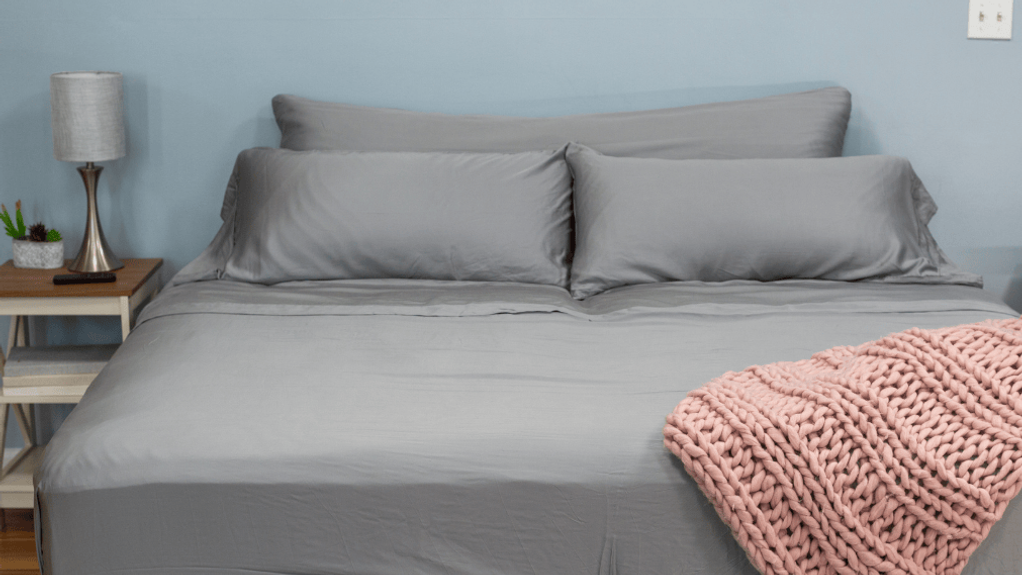What’s the secret to a good night’s sleep? It's not just about a quality mattress and sleeping position but also about clean sheets! The feeling of wrapping your big bod up in crisp, fresh-scented bedding is not just about comfort; it's about hygiene, too. If you’re wondering how often to wash your sheets (and how to get the job done), we’re here to help. So, let’s dive into it so you can dive into bed feeling confident that you’ll have the best sleeping experience possible.
How Often Should You Wash Your Sheets?
Studies revealed that the average number of days folks go without changing their sheets is 24 — which experts consider gross. As a general rule of thumb, you should wash your sheets about once a week, but there are a few exceptions. You can get away with cleaning them every two weeks if you’re not sleeping in your bed daily. On the flip side, you may need to toss them in the wash every three to four days if you have allergies, struggle with icky and sticky night sweats, or have fur babies who consider your bed theirs, too.
How to Wash Bed Sheets
While laundering your sheets may not be the most exciting task, it's important to take a little extra care to ensure they remain hygienic and comfortable. Here are a few straightforward tips to make regular washing easy — we promise it's not as daunting as it seems!
- Wash Separately: Sheets take up a lot of space, so wash them separately from your other bedding, clothing, and personal items. You don’t want them to get tangled up around the washer's agitator, which can result in wear, tear, and wrinkling.
- Cycle Smarts: Avoid tossing and washing without considering your machine’s cycle. If your sheets don’t have specific instructions, opt for a standard cycle that caters to cotton, polyester, or linen sheets. We recommend washing our Big Fig Premium Cooling Sheets in cold water before tossing them in a gentle tumble dry cycle.
- Pretreat Stains: While cold water can extend the life of your sheets, it can also make it more difficult to remove stains. Pretreat any stubborn stains with a mild detergent, a specialized spot remover, or a DIY blend of equal parts baking soda and water or white vinegar and water.
- Use a Mild Detergent:Big Fig Premium Cooling Sheets are made from cooling, eco-friendly TENCEL™ Lyocell fibers derived from various sustainably managed tree species, such as spruce, pine, birch, beech, and eucalyptus. That said, use a mild detergent to protect the integrity of the fabric.
- Reduce wrinkles: Immediately remove your sheets from the washer once the cycle finishes. Give them a good shake before putting them in the dryer to help reduce wrinkles.
Why It’s Important to Wash Your Sheets
Dead skin cells, sweat, saliva, body oils, and pet dander create a breeding ground for bacteria, leading to face and body breakouts, skin infections, fungal growth, allergies, sleep disturbances, and, at its worst, bed bugs, so it's crucial to wash those sheets! While we’re on the topic of bugs, as many as one million dust mites feed on your dead skin daily. Just because you can’t see them and they don’t bite doesn’t mean they don’t exist, full-figured friends.
How Often You Should Wash Your Comforter
If your comforter is protected with a duvet cover, you only need to wash it about three times a year. If you’re not using a duvet, then once a month is a more hygienic option. Other considerations that affect frequency include whether or not pets are in your bed, if you’re sensitive to allergens, or if the comforter becomes soiled.
What About Other Bedding?
Cleanliness and sleep health don’t stop with your sheets and comforter. Here’s how often to wash the rest of your bedding.
Duvet Cover:
- Weekly, if you don’t use a top sheet or spend time in bed engaged in activities like reading, watching television, or eating (who doesn’t love breakfast in bed?).
- Every other week if you use a flat sheet that separates your full-figured body from the duvet cover.
- Weekly if you have fur babies or children who love regular snuggle time.
Pillowcases:
- As with your sheets, wash your pillowcases weekly to remove excess oils, hair products, dead skin cells, and bacteria.
Blankets:
How often you wash your blankets largely depends on how frequently you use them, whether or not they come in direct contact with your body, and factors like pets, kiddos, and allergies.
- Weekly or biweekly if you snuggle up to your blanket nightly.
- Blankets placed between the sheets should be washed monthly.
- Wash immediately after you or your partner have been sick.
- Every few months will do if you only occasionally use a blanket or a throw.
Keep Your Sheets Fresh
While regularly washing your sheets is a surefire way to keep your sheets clean and smelling as fresh as a Spring day, here are a few additional tips to use between washes.
- Immediately remove your sheets from the washer when the cycle is complete to reduce wrinkles and prevent that undesirable wet dog aroma. Toss them in the dryer or line-dry them outside.
- Properly fold and store your sheets (and all of your bedding, for that matter) to ensure they stay fresh between uses. Make sure everything is 100 percent dry! Choose a well-ventilated storage spot, such as a cotton closet, so that air can circulate properly. Skip those plastic storage containers, as they only trap air, resulting in odors.
- Place a few dryer sheets between your bedding to retain that just-washed aroma. A few spritzes of essential oils or a fabric spray also do the trick.
Hopefully, by now, you don’t have to wonder how often to wash your sheets and bedding, but if you’re ever in question, the more, the better to help keep bacterial growth, breakouts, skin issues, allergies, bed bugs, dust mites, and allergies at bay. Even if your Big Fig Mattress has improved the quality of your slumber, the Sleep Foundation says clean sheets also promote better sleep, so pencil that weekly laundry day into your calendar!







